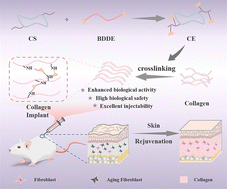A highly biocompatible CE-crosslinked collagen implant with exceptional anti-calcification and collagen regeneration capabilities for aging skin rejuvenation†
Abstract
Skin aging, a complex and inevitable biological process, results in wrinkles, dermal laxity, and skin cancer, profoundly influencing appearance and overall health. Collagen serves as the fundamental element of the dermal matrix; nevertheless, collagen is susceptible to enzymatic degradation within the body. Crosslinking is employed to enhance the physicochemical properties of collagen. However, conventional crosslinking agents may harbor potential issues such as cytotoxicity and calcification risks, constraining their application in the biomedical field. Therefore, we have for the first time developed a highly biocompatible CE-crosslinked collagen implant with exceptional anti-calcification and collagen regeneration capabilities for aging skin rejuvenation. A novel collagen crosslinking agent (CE) was synthesized through a reaction involving chitosan quaternary ammonium salt with 1,4-butanediol diglycidyl ether. Compared to collagen crosslinked with glutaraldehyde (GA), the CE-crosslinked collagen implant exhibited notable stability and durability. The implant demonstrated excellent injectability and viscosity, resisting displacement after implantation. Additionally, the CE-crosslinked collagen implant displayed superior biocompatibility, effectively promoting the proliferation and adhesion of HFF-1 cells compared with the GA-crosslinked collagen. The CE-crosslinked collagen represented a safer and more biologically active implant material. In vivo experiments further substantiated that the implant significantly facilitated collagen regeneration without inducing calcification. The innovative collagen implant has made substantial strides in enhancing aesthetics and reducing wrinkles, presenting the potential for revolutionary progress in the fields of skin rejuvenation and collagen regeneration.



 Please wait while we load your content...
Please wait while we load your content...